Table of Contents
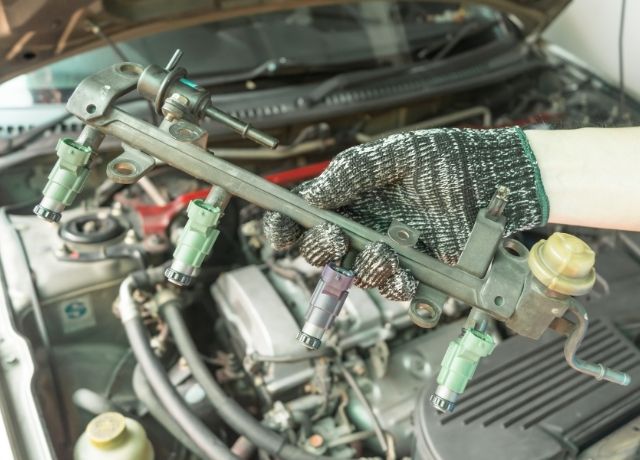
If One Fuel Injector Is Bad Should I Replace Them All? When faced with a situation like this, it’s difficult to decide whether to replace all of the injectors (which would be much more expensive) or just the defective one. You aren’t the only one in this situation.
Whenever an ABS sensor malfunctions, the results are similar. When one of a vehicle’s four ABS sensors fails, it may be difficult to decide which one should be replaced. Let’s see what you should do in this case of the fuel injector.
What Eats Car Paint the Fastest? 26 Jaw-dropping Substances
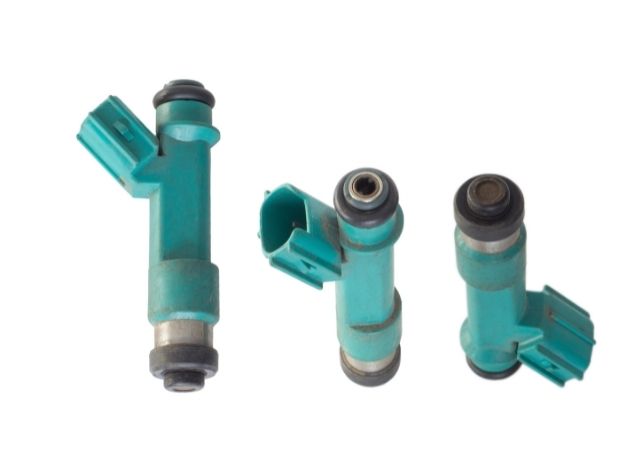
How To Clean a Fuel Tank Without Removing | Like a Boss In 2023
How Does a Fuel Injector Work?
A fuel injector’s primary job is to deliver fuel to the engine. Engines use an injector to spray (inject) their fuel into the combustion chamber so that it can start. The fuel must always be supplied at the perfect time, in the perfect proportion, and at the appropriate pressure, angle, and squirt sequence.
As the car’s “brain” or central computer, the Engine Control Unit (ECU) is responsible for managing several different systems. The ECU ensures that the injector sprays the appropriate quantity and timing of fuel via different sensors, resulting in the proper air/fuel mixture.
Fuel is pumped from the tank, through the fuel lines, and into the injector by a car’s fuel pump. When the ECU detects a need for fuel, it sends a signal to the fuel injector solenoid, which starts to release pressurized fuel into the cylinder.
Amazing Car Maintenance Checklist By Mileage 2022 You Need To Know
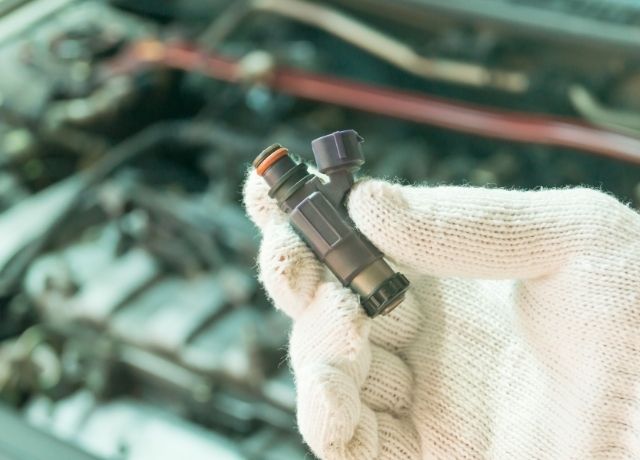
Symptoms of a Bad Fuel Injector:
Your car’s engine won’t run properly if one or more of the fuel injectors malfunctions for any reason.
An engine with a bad fuel injector will either not spray the correct amount of fuel into the engine or it will squirt it at the wrong intervals. Either way, your car won’t run properly or it will be completely undrivable altogether.
Here are nine symptoms of a Bad Fuel Injector. A dirty fuel injector can cause similar problems, so it’s best to test your fuel system with an injector cleaner before shelling out the cash to replace them.
To clean your fuel injectors, you can either hire a technician or buy a fuel injector cleaning kit and perform the procedure yourself. You’ll want to fix the problem as soon as possible so that your engine isn’t harmed in any way.
Engine Misfires:
A clogged injector will cause the engine to misfire if it doesn’t receive sufficient fuel sprayed into it while driving. There will also be a short delay in the car’s acceleration after you press the gas pedal.
To avoid overheating or other issues that can occur if the appropriate air/fuel mixture is disrupted, you’ll need to take care of the issue as soon as possible. As soon as you notice the engine misfires, keep in mind that it may be the initial symptom of a bad fuel injector.
Rough Idle:
A rough or violent idle is caused by a lack of fuel or an irregular supply of fuel, which lowers the RPM when the car is idled. If the RPM drops too low, the car will stall and you’ll have to start it up again.
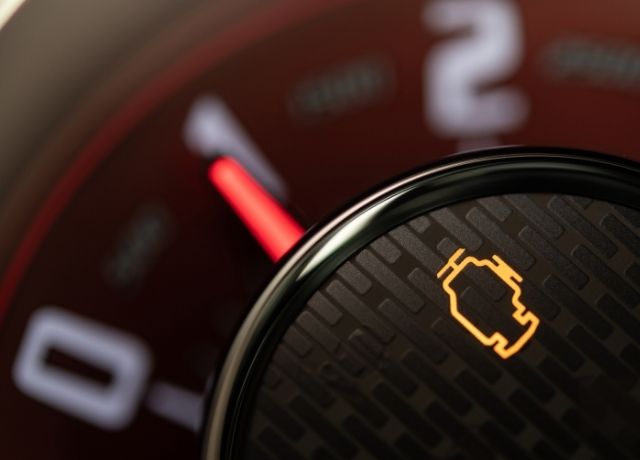
Check Engine Light:
When your dashboard’s “Check Engine” light comes on, you know there’s a problem. A bad fuel injector might be one of the possible causes of this.
The engine’s efficiency is reduced and the CEL may come on if an injector provides less fuel than necessary (or more in some instances). To confirm the problem, use an OBD2 scanner.
Engine Vibrations:
The matching cylinder will be unable to fire if the fuel injector malfunctions. As a result, the engine will tremor or hiccup as it tries to complete each cycle without gasoline while on the go. This is one of the indications of a bad fuel injector.
Fuel Leak:
A broken or cracked fuel injector will cause gasoline to seep out of this if it’s damaged or old. Because of this, the nozzle will not receive fuel, and instead, fuel will escape from the body.
If you look at the fuel injector, you will see gasoline on the outside or on the fuel rail that is close by. The fuel injector seal is frequently the source of leaks since it degrades over time. This clearly indicates your fuel injector failure.
Fuel Smell:
In addition to a fuel leak, you’ll be able to smell gasoline if the fuel isn’t burning properly because of a damaged injector or an open injector. Occasionally, a defective sensor or clogged fuel lines can cause the ECU to inject extra fuel than it should.
Before it becomes a major safety problem, you need to locate the source of the gasoline odor and remedy it immediately.
Engine Surge:
Injecting too much gas into the engine cylinder can cause the vehicle to accelerate much more slowly than normal. With a steady load, you’ll notice that the engine RPM fluctuates noticeably rather than maintaining constant while driving.
Failed Emission Test:
An irregular or partial fuel burn might lead to higher emissions if the fuel injectors fail to function properly or leak. As a result, your odds of failing an emissions inspection are considerably increased.
A high air/fuel mixture caused by a fuel injector leak might end up burning out the catalytic converter in some vehicles.
Bad Fuel Economy:
The increased demand for the injector if the engine is not getting enough fuel for combustion will put more stress on the injector. This results in poor fuel efficiency due to the additional fuel that the car’s ECU believes is needed but is in reality not required. It clearly indicates the fuel injector failure.
These were the 9 most common symptoms of a Bad Fuel Injector, take caution as soon as you notice one before any of them leads to an expensive repair.
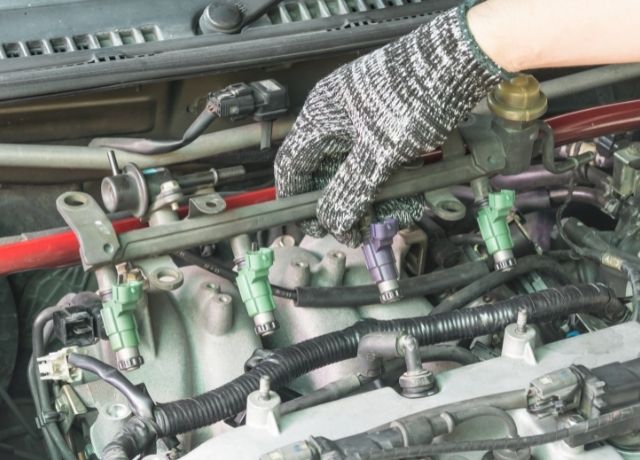
If One Fuel Injector Is Bad Should I Replace Them All?
Some factors may necessitate the purchase of just one new injector. However, it all depends on your circumstances. The following are a few of the contributing factors:
- The vehicle’s mileage and year of manufacture
- Budget
- Fuel injector failure: what caused it?
- Your ability if you decide to do it yourself
The Vehicle’s Mileage and Year of Manufacture:
The replacement of a single injector may be all that is required on a brand-new vehicle. When we refer to a vehicle as “new,” we mean that it is less than five years old and has fewer than 50,000 miles on the odometer. A single fuel injector replacement can be costly, and some manufacturers don’t make it easy to do so.
The failure of a single injector could indicate that the rest of the engine’s injectors are also old and about to fail if the car is older than 10 years or has driven more than 100,000 miles. Multiple injectors failing at the same time is extremely rare. Other components may be to blame, which is why an experienced diagnostician will examine the entire system.
Budget:
There is a wide range of prices for a single set of fuel injectors. The price of a new fuel injector depends on a variety of factors. In the lower price range, you’ll find smaller cars with fewer cylinders, which require minimal expensive components.
As a result of the added complication and time required to repair larger, high-performance engines, the parts, and labor costs for these vehicles appear to be greater.
You should not spend money except if you know exactly what you need to. if you are low on cash and have free time. However, if spending a few hundred dollars isn’t a big deal to you, then go ahead and make the purchase.
Fuel Injector Failure: What Caused It?
Only when a fundamental problem arises will an injector stop working for good. The longer you leave your car on the road, the more likely you are to encounter one of these problems.
A comprehensive diagnosis of the fuel injection system is one way to ensure that there are no underlying problems. Before replacing the failed injection system, you must ensure that there are no issues with the fuel pressure controller, wiring harness, or injector driver subsystem. You must do this because there may be an actual reason that will come back to haunt you.
Your Ability If You Decide To Do It Yourself:
The replacement of a fuel injector requires specialized cleaning and testing machinery, according to Your Mechanic.
If you have any doubts about your ability to complete the task, you should seek assistance from someone who does. We’ve seen folks who lack sufficient skills or discipline replace parts that they will never need, which then causes problems because of their improper installation.
It would be a hassle to take everything apart before putting it all back together only to have the problem persist or worsen. Now you can see if you made a mistake or misplaced a part, or if the portion you removed was defective and needs replacing.
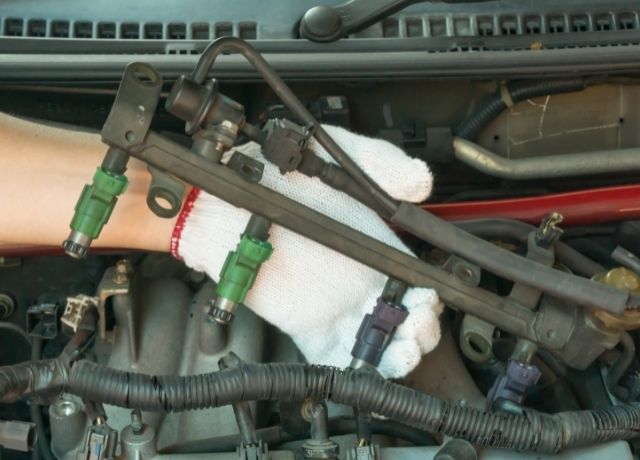
Cleaning Cost of a Bad Fuel Injector:
You can take measures to extend the life of your fuel injectors as much as possible. Every 30,000 miles or so, experts suggest that the fuel injectors be kept clean. As a result, the injectors will not become jammed and will be able to deliver fuel to the fuel tank.
Fuel Injector Cleaner:
An inexpensive and convenient way to keep your fuel injectors clean is to use a fuel injector cleaner regularly. A bottle of cleaning solution will cost you between $10 and $15.
If your injectors are already displaying symptoms of clogging, you should use one bottle every time you change your oil, but you can use it about once every time you fill your tank.
Professional Fuel Injector Cleaning:
Expert cleaning is necessary for more extreme situations of clogged or dirty injectors. For this service, you can expect to pay between $50 and $100.
To save you time and money, some businesses will ship your dirty injectors to be cleaned and returned to you for around $15-$20 each. They’ll do a great job, but you’ll have to wait if you need your car while they work.
Fuel Injector Cleaning Kits:
Fuel injector cleaning kits can be purchased by mechanics who work part-time or full-time, and they typically pay for themselves within a few uses. This OTC set comes with a variety of adapters that allow you to work on a wide range of fuel-injected cars.
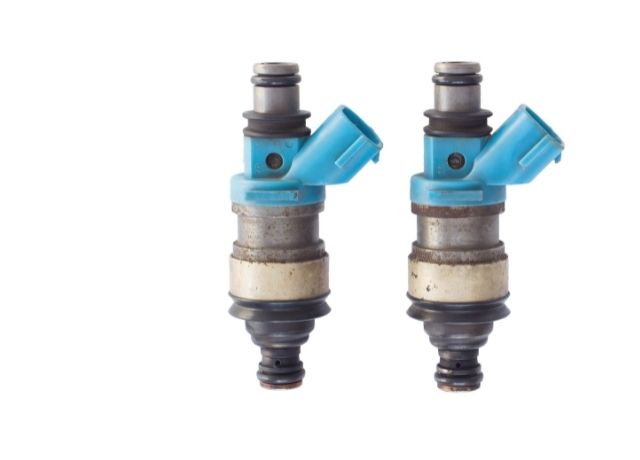
Frequently Asked Questions:
Can I Drive With a Bad Fuel Injector?
Using a faulty fuel injector for a short period of time is possible, but it is not advised. It’s best to keep your speed down as much as you can while driving with a suspicious fuel injector malfunction.
Even though only one faulty fuel injector is not really a major issue in and of itself, driving with one could contribute to other engine issues.
The best course of action, if you assume that your car’s fuel injectors may be malfunctioning, is to have your vehicle towed to a shop (or hire a mobile mechanic) as soon as possible.
Modern cars, on the other hand, make it easier to drive with bad fuel injectors. Modern cars’ technological advancement allows the engine to partially compensate for a defective fuel injector.
How Much Does It Cost To Replace Fuel Injectors?
In most cases, an expert cleaning or replacing the O-rings if a leak appears to exist can resolve most fuel injector problems. A fuel injector must be replaced if it cracks or breaks, and this can be a costly process.
Fuel injectors are intended to collaborate effectively, even though each injector is unique. To put it simply, you should always replace all your injectors, even if you only need to replace one.
Fuel injector replacement can cost anywhere from $800 to $1,450, depending on the make and model of your vehicle. It will cost between $600 and $1200 for the parts and between $200 and $250 for the labor.
Of course, there are exceptional cases. You can save some cash by using non-OEM parts, but some car models can cost more than $2,000 for a substitute. Shop around for this kind of position.
Can I Replace Just One Fuel Injector?
Depending on the severity of the problem and your specific car, you may need to replace just one or more of the malfunctioning fuel injectors.
If you have a diesel truck, for example, replacing a fuel injector can cost quite a bit of money. It may be more cost-effective to replace all of the fuel injectors because of the time and effort required to access them.
Having a diesel truck’s fuel injectors replaced is expensive enough without having to spend even more money on a second failed injector.
It may be more cost-effective to simply replace the malfunctioning fuel injector on a small gas-powered vehicle.
What are The Symptoms of a Bad Fuel Injector?
Following are the 9 most common symptoms of a Bad Fuel Injector.
Engine Misfires
Rough Idle
Check Engine Light
Engine Vibrations
Fuel Leak
Fuel Smell
Engine Surge
Failed Emission Test
Bad Fuel Economy
If you encounter any one of these symptoms, we suggest taking your car to a qualified mechanic for a proper diagnosis, even if the problem isn’t limited to bad fuel injectors.
However, if you are confident that you can fix the issue yourself, nothing would be better than giving it a try yourself.
Before that make sure that you have the proper knowledge and tools for that. Or you may end up creating a new mess.
Should I Clean or Replace the Fuel Injectors?
It totally depends on the condition of your fuel injectors. If you notice any of the mentioned symptoms of a bad fuel injector you can always try to clean the fuel injectors.
Taking advice from an expert would be a great option. No matter what, It is always ideal to clean your fuel injectors every 3 years or 45,000 miles whichever comes first.
Bottom Line:
An entire system’s worth of issues can be caused by a single bad injector. If it fails in an older vehicle, it’s likely that the rest will as well. Only replacing one fuel injector will do you little good and cost you time and money unless you fix other stuff that may be affecting your fuel injector to collapse (which is common).
You can prevent future problems by replacing all of them if your car is old and you have the money to do so. Unless you address the root cause of your issues, the problem is only going to get worse and cost you more money in the long run.
If you’re strapped for cash, it’s best to hold off on replacement until you have more, as doing nothing now may prevent you from having to make some other costly repairs in the future.
Before replacing your injector, run a diagnosing scan to see whether there is another that could be creating the trouble. It’s better to just replace the bad injector if you have got a code for it than to install a new system. The problem may not go away after you apply this initial fix, in which case you will have to carry out an additional investigation.




























































8 thoughts on “If One Fuel Injector Is Bad Should I Replace Them All? 2023 Ultimate Guide – Flawless Car Guide”